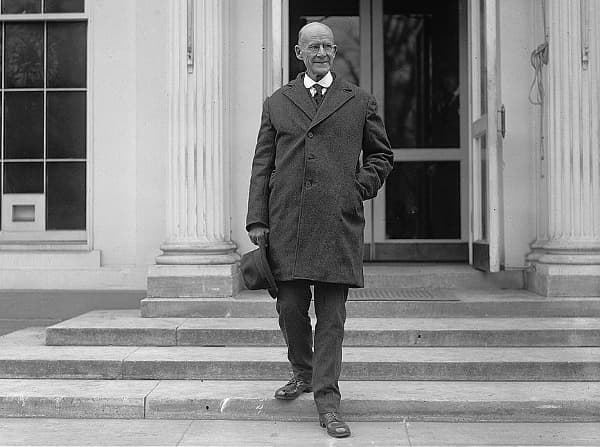Will Anti-Trump Left Learn From Eugene Victor Debs?
The high-minded Hoosier was the last candidate of a significant party to stand for the presidency from a prison cell.

With the latest poll — from Harvard, no less — now predicting that President Trump would trounce President Biden in 2024, it will soon be time for an editorial in respect of Eugene Victor Debs. A United States judge in California is already saying, without having put a particle of evidence in front of a jury, that it is “more likely than not” that Mr. Trump committed felonies by attempting to block the 2020 election certification.
Meantime, the January 6 Committee is preparing to make in respect of Mr. Trump something close to a Bill of Attainder, namely “criminal referrals” to the Justice Department. Then again, too, someone — wonder who — leaked to the New York Times a letter claiming Mr. Trump committed crimes in his banking deals. Plus, too, Georgia is looking at Mr. Trump’s calls to state officials regarding its vote count. So what about Debs?
The high-minded Hoosier was the last candidate of a significant party to stand for the presidency from a prison cell. We wouldn’t suggest any inevitability about Mr. Trump getting indicted, never mind convicted. Yet the very scale of the legal net that is being woven by Congress, federal prosecutors, and state investigators raises the possibility that it could ensnare Mr. Trump. Upon which there could be the Debs precedent.
The two men have little in common apart from being polarizing figures. Debs, born in 1855 at Terre Haute, was a pioneering labor leader and Bryanite Democrat who embraced socialism after reading Marx. During World War I, he urged the working class to keep out of the fighting. “I will never go to war for a capitalist government,” he declared. Debs, the Sun reported, told an audience that they were “fit for something better than cannon fodder.”
Debs was eventually arrested under the Sedition Act. During his trial, he denounced the war, endorsed revolution, and said the Russian Bolsheviks had written “a chapter of glorious history.” He was convicted for obstructing military recruitment and sentenced to ten years in the hoosegow. In Debs v. United States, a unanimous Supreme Court held that the First Amendment does not protect speech intended to foil military recruiting.
Debs called the decision “consistent with the character of the Supreme Court as a ruling class tribunal.” As inmate number 9653 at the penitentiary at Atlanta, he was in 1920 nominated by the Socialist party as its candidate for president. He was permitted to make one public statement each week during the campaign. He decried President Wilson as “a tool of Wall Street” and the League of Nations as the “new capitalist international.”
Debs was popular in prison, his biographer Raymond Ginger observes, and his fellow inmates believed he stood a good chance of winning the election, at which point he would pardon them — and himself. In the end he received fewer than a million votes on election day — 3.4 percent of the popular vote. When measured against the popular vote cast in 2020, that would have netted Debs a not-inconsequential 5.3 million votes.
When President Harding commuted Debs’ sentence, his only regret was leaving the other inmates: “These men need me.” As he left the prison, Ginger writes, “the nation’s foremost political prisoner” was given a rousing farewell by the 2,300 assembled inmates and the “ivied walls trembled.” Debs “turned and paused,” Ginger reports, “facing his friends, tears streaming down his cheeks, his hat held immobile high above his head.”
The lesson of the Debs case is to beware of trying to run a politician out of a race by using jumped-up criminal charges. After Harding commuted Debs’ sentence, he also invited him to the White House, to which he was escorted by one of the towering newspapermen of the era, Abraham Cahan of the Forward. It was testament to the fact that the Debs prosecution had become a cause célèbre among civil liberties advocates.
The possibility that Mr. Trump’s campaign could be helped by a prison stint seems, in our view, to be underestimated by those “pursuing accountability,” as the judge in California put it, for his role on January 6. We can easily imagine, in light of how Debs left prison a more popular figure than he entered, that such an ordeal might well bolster Mr. Trump’s cause, especially since he is not weighted by the albatross of socialism.

